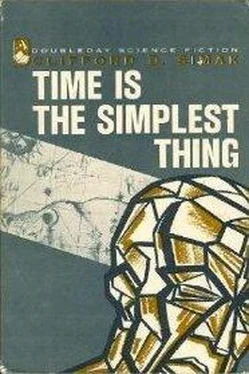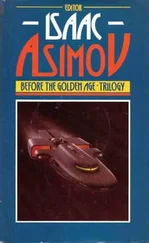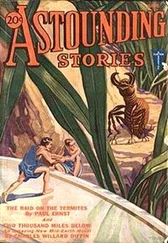Blaine didn’t wait to see. He went running down the stairs. Beyond the dark lines of parked vehicles stood a single car, with its taillights gleaming and its motor humming softly.
It was Harriet’s car, Blaine told himself, but it was headed the wrong way — not down the road toward the canyon’s mouth, but into the canyon’s maw. And that was wrong, he knew, because the road pinched out a mile or two beyond.
He reached the bottom of the steps and threaded his way among the cars out into the road.
Harriet sat waiting in the car, and he walked around it and opened the door. He slid into the seat.
Weariness hit him, a terrible, bone-aching weariness, as if he had been running, as if he’d run too far. He sank into the seat and looked at his hands lying in his lap and saw that they were trembling.
Harriet turned to look at him. “It didn’t take you long,” she said.
“I got a break,” said Blaine. “I hurried.”
She put the car in gear and it floated up the road, its airjets thrumming and the canyon walls picking up the thrumming to fling it back and forth.
“I hope,” said Blaine, “you know where you are going. The road ends up here a ways.”
“Don’t worry, Shep. I know.”
He was too tired to argue. He was all beaten out.
And he had a right to be, he told himself, for he had been moving ten times (or a hundred times?) faster than he should, than the human body ever had been intended to. He had been using energy at a terrific rate — his heart had beat the faster, his lungs had worked the harder, and his muscles had gone sliding back and forth at an astounding rate.
He lay quietly, his mind agape at what had happened, and wondering, too, what had made it happen. Although the wonder was a formalized and an academic wonder, for he knew what it was.
The Pinkness had faded out of him, and he went hunting it and found it, snug inside its den.
Thanks, he said to it.
Although it seemed a little funny that he should be thanking it, for it was a part of him — it was inside his skull, it sheltered in his brain. And yet not a part of him, not yet a part of him. But a skulker no longer, a fugitive no more.
The car went fleeing up the canyon, and the air was fresh and cool, as if it had been new-washed in some clear mountain stream, and the smell of pine came down between the walls like the smell of a faint and delicate perfume.
Perhaps, he told himself, it had been with no thought of helping him that the thing inside his brain had acted as it did. Rather it might have been an almost automatic reflex action for the preservation of itself. But no matter what it was, it had saved him as surely as itself. For the two of them were one. No longer could either of them act independently of the other. They were bound together by the legerdemain of that sprawling Pinkness on that other planet, by the double of the thing that had come to live with him — for the thing within his mind was a shadow of its other self five thousand light years distant.
“Have trouble,” Harriet asked.
“I met up with Freddy.”
“Freddy Bates, you mean.”
“He’s the one and only Freddy.”
“The little nincompoop.”
“Your little nincompoop,” said Blaine, “was packing a gun and he had blood within his eyes.”
“You don’t mean—”
“Harriet,” said Blaine, “this is liable to get rough. Why don’t you let me out—”
“Not on your life,” said Harriet. “I’ve never had so much fun in all my life.”
“You aren’t going anywhere. You haven’t much road left.”
Shep, you may not think it to look at me, but I’m the intellectual type. I do a lot of reading and I like history best of all. Bloody battle history. Especially if there are a lot of campaign maps to follow.”
“So?”
“So I’ve found out one thing. It is always a good idea to have a line of retreat laid out.”
“But not up this road.”
“Up this road,” she said.
He turned his head and watched her profile and she didn’t look the part — not the hard-boiled newspaper gal that she really was. No chatter column writer nor a sob sister nor a society hen, but one of the dozen or so top-notch reporters spelling out the big picture of Fishhook for one of the biggest newspapers in North America.
And yet as chic, he thought, as a fashion model. Chic, without being sleek, and with an air of quiet assurance that would have been arrogance in any other woman.
There was nothing, he was sure, that could be known of Fishhook which she didn’t know. She wrote with a strangely objective viewpoint, one might almost say detached, but even in that rare atmosphere of journalistic prose she injected a soft sense of human warmth.
And in the face of all of this, what was she doing here?
She was a friend, of course. He had known her for years, ever since that day shortly after she had arrived at Fishhook and they had gone to dinner at the little place where the old blind woman still sold roses. He had bought her a rose, he remembered, and being far from home and lonesome she had cried a little. But, he told himself, she’d probably not cried since.
Strange, he thought, but it all was strange. Fishhook, itself, was a modern nightmare which the outer world, in a century’s time, had not quite accepted.
He wondered what it had been like, that century ago, when the men of science had finally given up, when they had admitted that Man was not for space. And all the years were dead and all the dreams were futile and Man had finally ended up in a little planetary dead-end. For then the gods had toppled, and Man, in his secret mind, had known that after all the years of yearnings, he had achieved nothing more than gadgets.
Hope had fallen on hard times, and the dreams had dwindled, and the trap closed tight — but the urge to space had refused to die. For there was a group of very stubborn men who took another road — a road that Man had missed, or deserted, whichever you might choose, many years ago and ever since that time had sneered at and damned with the name of magic.
For magic was a childish thing; it was an old wives’ tale; it was something out of nursery books — and in the hard and brittle world of the road that Man had taken it was intolerable. You were out of your mind if you believed in magic.
But the stubborn men had believed in it, or at least in the principle of this thing which the world called magic, for it was not actually magic if one used the connotation which through the years had been placed upon the word. Rather it was a principle as true as the principles which underlay the physical sciences. But rather than a physical science, it was a mental science; it concerned the using of the mind and the extension of the mind instead of the using of the hands and the extensions of the hands.
Out of this stubbornness and this belief and faith Fishhook had arisen — Fishhook because it was a reaching out, a fishing into space, a going of the mind where the body could not go.
Ahead of the car the road swung to the right, then swiveled to the left, in a tightening curve. This was the turnaround; here the road came to an end.
“Hang on,” said Harriet.
She swung the car off the road and nosed it up a rocky stream bed that ran along one of the canyon walls. The airjets roared and blustered, the engines throbbed and howled. Branches scraped along the bubble top, and the car tilted sharply, then brought itself aright.
“This is not too bad,” said Harriet. “There is a place or two, later on, where it gets a little rough.”
“This is the line of retreat you were talking about?”
“That’s exactly right.”
And why, he wondered, should Harriet Quimby need a line of retreat? He almost asked her but decided not to.
Читать дальше








